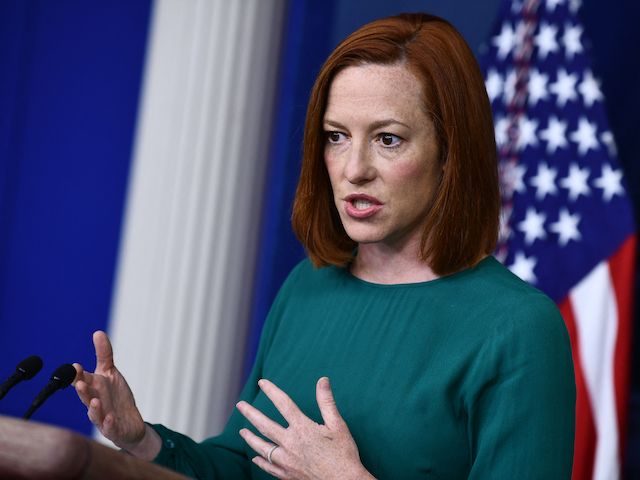The White House disputes complaints from radical leftists, who say the bipartisan infrastructure deal does not sufficiently address climate change-related concerns.
On Monday, President Joe Biden’s press secretary, Jen Psaki, addressed complaints lodged by radical climate change activists as hundreds of protesters gathered outside the White House, demanding the administration prioritize Green New Deal initiatives in the infrastructure bill.
“What is your message to climate activists who feel like, ‘Wait a second, we thought that President Biden was going to be the most aggressive president ever on this topic. Why is his first high-profile bill so whittled down?'” a reporter asked the press secretary on Monday.
“I would dispute the notion that it’s — that it doesn’t do anything for climate, which some are arguing,” Psaki responded, citing “key components” which she said would “represent historic investments in areas like addressing the legacy of pollution and cleaning up communities across the country, preventing — that have relied on fossil fuels, and others that have been polluted, especially lower-income communities.”
She continued:
It also will take enormous steps in addressing — investing in clean energy transmission. It will include making sure electric vehicle buses are part of our force across the country, and make sure electric — that purchasing electric vehicles will — which would be a huge contributor to reducing greenhouse gas emissions — is something that can be a reality for millions of Americans.
Now, whether or not everyone is aware of all those specifics, that’s incumbent on us to keep conveying that, communicating it, listening, and making sure people understand that this is a down payment. And the President will continue to advocate for, press for, work for even more on the climate, as he will in the reconciliation bill and process, moving forward.
Similarly, Biden penned an op-ed Monday, admitting the bill is “missing some critical initiatives on climate change” but promising to address those in a reconciliation measure while defending the bipartisan infrastructure deal as a “crucial step forward in building our clean energy future.”
“It would make the largest investment in clean energy transmission in American history, modernizing our power grid to accelerate the build-out of zero-carbon, renewable energy,” he wrote, claiming it would replace “thousands of gas-guzzling buses with clean, electric ones — including 35,000 electric school buses”:
And more: The deal would deploy a nationwide network of charging stations for electric vehicles — 500,000 stations in total. It makes historic investments in rail and transit that will get passenger vehicles off the road and reduce fossil fuel consumption. There’s much more work to do to reach our ambitious climate goals, but the investments in this deal are critical in facilitating our transition to a clean energy economy.
Across the country, we will also strengthen and revitalize our natural infrastructure — our coastlines and levees — while preparing our physical infrastructure for wildfires, floods and other extreme weather events.
Sen. Bernie Sanders (I-VT) is among far-left Democrats who have vowed that there will “not be a bipartisan infrastructure deal without a reconciliation bill that substantially improves the lives of working families and combats the existential threat of climate change.”
“No reconciliation bill, no deal,” he said. “We need transformative change NOW”:
Let me be clear: There will not be a bipartisan infrastructure deal without a reconciliation bill that substantially improves the lives of working families and combats the existential threat of climate change. No reconciliation bill, no deal. We need transformative change NOW.
— Bernie Sanders (@SenSanders) June 27, 2021
House Speaker Nancy Pelosi (D-CA) is on the same page, promising to effectively blow up the infrastructure deal if it is not paired with a reconciliation bill, which would allow Democrats to pass their far-left agenda items without fear of a GOP filibuster.
Watch:
House Speaker Nancy Pelosi / Facebook“Let me be really clear on this: we will not take up a bill in the House until the Senate passes the bipartisan bill and a reconciliation bill,” Pelosi said. “If there is no bipartisan bill, then we’ll just go when the Senate passes a reconciliation bill.”

COMMENTS
Please let us know if you're having issues with commenting.